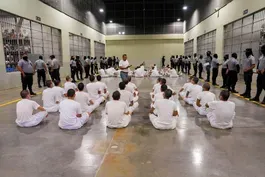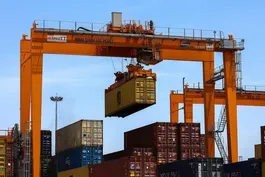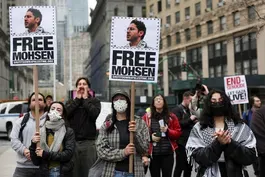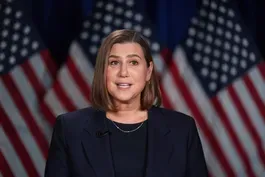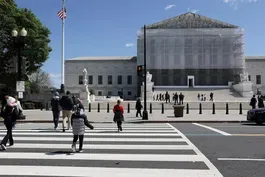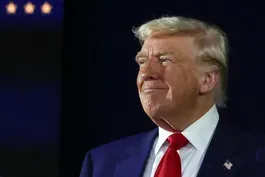
A look at the partnership between Vietnam and the U.S.
Clip: 4/30/2025 | 11m 32sVideo has Closed Captions
A look at the partnership between Vietnam and the U.S. 50 years after the fall of Saigon
Vietnam marked the 50th anniversary of the fall of Saigon and the unification of the country under Communist rule after decades of war. From the ashes, the U.S. and Vietnam now enjoy close relations, due in no small part to American veterans who sought to revive a country they once helped destroy. Nick Schifrin reports.
Problems with Closed Captions? Closed Captioning Feedback
Problems with Closed Captions? Closed Captioning Feedback
Major corporate funding for the PBS News Hour is provided by BDO, BNSF, Consumer Cellular, American Cruise Lines, and Raymond James. Funding for the PBS NewsHour Weekend is provided by...

A look at the partnership between Vietnam and the U.S.
Clip: 4/30/2025 | 11m 32sVideo has Closed Captions
Vietnam marked the 50th anniversary of the fall of Saigon and the unification of the country under Communist rule after decades of war. From the ashes, the U.S. and Vietnam now enjoy close relations, due in no small part to American veterans who sought to revive a country they once helped destroy. Nick Schifrin reports.
Problems with Closed Captions? Closed Captioning Feedback
How to Watch PBS News Hour
PBS News Hour is available to stream on pbs.org and the free PBS App, available on iPhone, Apple TV, Android TV, Android smartphones, Amazon Fire TV, Amazon Fire Tablet, Roku, Samsung Smart TV, and Vizio.
Providing Support for PBS.org
Learn Moreabout PBS online sponsorshipGEOFF BENNETT: Today, Vietnam marked the 50th anniversary of the fall of Saigon and the unification of the country under communist rule after decades of war.
But, 50 years later, from the ashes, the U.S. and Vietnam now enjoy close relations, due in no small part to American veterans who sought to revive a country they once helped destroy.
Here's Nick Schifrin.
NICK SCHIFRIN: In Vietnam's capital today, a celebration of what they called a victory of justice, with uniforms similar to those worn by communist North Vietnamese troops, a flyby by Russian jets, and a parade led by the communist leader who defeated the United States and provided this city's modern name.
But 50 years later, this Vietnamese leadership did not fight the war, and this anniversary parade is not only about triumph, but also reconciliation.
TO LAM, General Secretary, Vietnamese Communist Party (through translator): From a poor backward country ravaged by war under embargo and isolation, today, Vietnam is deeply integrated into international politics, the global economy, and the civilization of humankind.
NICK SCHIFRIN: For the U.S., April 30, 1975, was a day of disgrace.
The U.S. abandoned its embassy via helicopter, the final moment of what's known here as the American war that killed as many as three million and drove millions more from their homes.
But, for Vietnam, April 30, 1975, was the first act of reunification.
North Vietnam and Vietcong soldiers conquered Saigon and U.S. ally South Vietnam, ending a 30-year fight against colonialism.
Today, Vietnam has one of Asia's youngest populations, for whom helicopters are a source of pride.
TRINH THI THANH THUY, Ho Chi Minh City, Vietnam Resident (through translator): Peace is when you hear the roar of helicopters, but you run toward them to watch.
PHUNG THI THANH HUONG, Ho Chi Minh City, Vietnam Resident (through translator): And we went wow at the fighter jets.
That's what peace means to us.
NICK SCHIFRIN: A peace born from the legacy of war.
The U.S. dropped more than seven million tons of bombs, three times what it used in World War II.
And it sprayed Agent Orange to kill trees to expose fighters, but it also exposed U.S. troops and damaged the bodies and genes of some four million Vietnamese.
But if American troops were the culprit, some became the redeemer.
JOHN TERZANO, International Commission on Missing Persons: You begin to wonder, how did we ever go to war with these people?
NICK SCHIFRIN: That is John Terzano, a former sailor who served in the Gulf of Tonkin, and returned to Vietnam in December 1981, part of the first visit by Vietnam combat veterans.
JOHN TERZANO: We're sitting down with people who 10 years before, if we would have met them and killed them, we would have gotten medals for it.
Now we're sitting down.
We're having conversations.
They're feeding us, we're laughing, we're joking.
It's -- we're finally starting to see Vietnam for what it is, a beautiful country, and the Vietnamese people not as the enemy.
NICK SCHIFRIN: The group visited victims of Agent Orange, helping them realize the damage that the war and its fighters had wrought.
JOHN TERZANO: We got people here that are hurting, that with humanitarian efforts, just like that little hospital we went to today.
NICK SCHIFRIN: Out of that trip was born joint efforts to find remains of missing soldiers, clear unexploded ordnance, and clean some of the Agent Orange left behind.
All that built trust that opened doors.
THAO GRIFFITHS, Commissioner, International Commission on Missing Persons: It served as a foundation for the U.S.-Vietnam relations.
I would say unequivocally that, without the war legacy program serving as a solid foundation for the U.S. and Vietnam relations, we wouldn't get to where we are today, absolutely not.
NICK SCHIFRIN: Thao Griffiths is a commissioner on the International Commission of Missing Persons and the former country director of the Vietnam Veterans of America Foundation.
THAO GRIFFITHS: With that enabling environment, with that solid foundation, the trade and commerce can take place and can really booming in the last three decades.
NICK SCHIFRIN: The U.S. has become Vietnam's number one export market, and the two militaries cooperate to counter neighboring China.
The relationship crescendoed to Vietnam's highest level of partnership.
JOE BIDEN, Former President of the United States: This new elevated status that will be a force for prosperity and security in one of the most consequential regions in the world.
DONALD TRUMP, President of the United States: This is liberation day.
NICK SCHIFRIN: But President Trump slapped 46 percent tariffs on Vietnam before issuing a pause.
The administration stopped and defunded many legacy of war projects before restarting and refunding some.
THAO GRIFFITHS: Without continuing or maintaining the war legacy programs underneath, it would be difficult to say that you can do all the commerce and trade and defense and security and everything else on top.
NICK SCHIFRIN: U.S.-Vietnam strains continue today to which level U.S. diplomat would attend.
But for the Vietnamese, at least, today was not about the U.S. THAO GRIFFITHS: For me, today is about Vietnam.
It is really about an unity of North and South, of all generations within Vietnam.
It makes us proud, because we want you to see us, how far we have come in the last 50 years.
NICK SCHIFRIN: And to explore the 50 years since America left Vietnam as well as the present relationship, we turn to Daniel Kritenbrink, who was the U.S. ambassador to Vietnam during the first Trump administration and was assistant secretary of state for East Asian and Pacific affairs during the Biden administration.
He is now a partner at the Asia Group, an international consulting firm.
Daniel Kritenbrink, thanks very much.
Welcome back to the "News Hour."
DANIEL KRITENBRINK, Former U.S.
Ambassador to Vietnam: Thank you, Nick.
Honor to be here.
NICK SCHIFRIN: This is a country, Vietnam, where a million people at least died fighting the United States, where some 50,000-plus Americans died in country during the war, a country that became a touchstone here in the United States for a generation.
How did we get here today from the end of the war to the U.S. having this comprehensive strategic partnership, and Vietnam really being one of the U.S.' most important partners in Asia?
DANIEL KRITENBRINK: Well, Nick, it truly is extraordinary what the United States and Vietnam have achieved over the last 50 years.
To go from the brutality of that war and the depth of the tragedy that both countries experienced to now, as you said, where Vietnam is one of America's closest partners and friends, truly is extraordinary, I think one of the most amazing stories of the last half-century.
NICK SCHIFRIN: Well, we heard that from the piece that we just aired, that the Vietnam veterans who came over and the Vietnamese partners they had, they were essential.
That people-to-people relationship Over Agent Orange, over unexploded ordinance, how essential was that?
DANIEL KRITENBRINK: Absolutely vital.
I always tell people that, today, the U.S.-Vietnam partnership is a forward-looking friendship.
We spend the vast majority of our time talking about the here and now and where we want to go in the future, but make no mistake about it.
That friendship is built on a foundation of having dealt responsibly and carefully with issues of the past.
NICK SCHIFRIN: How important has Vietnam specifically become to the U.S. effort to respond to Beijing's regional efforts?
DANIEL KRITENBRINK: I think it's central.
It's vital.
The United States and Vietnam, we share a vision of the kind of region and the kind of world that we want to live in, a world in which countries play by the rules, large and small, and a world in which all countries can prosper and benefit, and no one country dominates others.
NICK SCHIFRIN: And manufacturing, what part does that play in it?
DANIEL KRITENBRINK: Well, the trade relationship, it's extraordinary, Nick.
If you go back to 1994 and 1995, our trade was almost nonexistent.
Today we have a nearly $150 billion trading relationship.
Vietnam is one of our fastest growing export markets.
Of course, we have a very large trade deficit as well, but there's no doubt across the board, from economics to security to health to people-to-people ties, Vietnam is an extraordinarily important and capable partner.
NICK SCHIFRIN: So that's where we have been over the last few years, and it's evolved to that point.
Earlier this year, the Trump administration took a couple of steps.
One, they cut off funding for those projects that we were just talking about, legacy of war projects, things like Agent Orange, things like cleaning up unexploded ordnance, and restored part, but not all of that funding.
And then the Trump administration placed 46 percent tariffs on Vietnam and again paused those tariffs.
And now Vietnam, like every other country in the world, is on 10 percent tariffs.
What do you believe is the cumulative impact of those steps this administration has taken, even though, again, they have pulled them back?
DANIEL KRITENBRINK: I think that Vietnamese friends have been surprised and perhaps shocked by some of the steps that they have seen coming from Washington.
I think they were deeply unnerved by the initial steps to cut off the funding for the legacy of war work that you and I have discussed.
But, secondly, they were probably even more stunned to see the 46 percent tariff rate levied on them on April 2.
And I think, for Vietnamese friends, they continue to look at the United States as an incredibly important partner with whom they can balance against China and other challenges.
And so they were surprised to think that the United States would carry out such a move against them.
And I think, also, the Vietnamese had such a positive experience with President Trump in his first term.
I think that only increased the impact of the moves.
Now, the good news is, though, the Vietnamese moved very quickly.
And after they, I think, got over the initial shock and some of the anger that they felt, they picked up the phone and now we have an agreement where the United States and Vietnam are going to conduct negotiations on some sort of a deal that will hopefully address U.S. concerns and bring those tariff levels down.
NICK SCHIFRIN: Do you foresee those trade negotiations ending with a new agreement that would lower tariffs?
DANIEL KRITENBRINK: I think that the Trump administration wants a trade deal.
There's a deal to be had.
The Vietnamese are very practical, they're very focused, and I think they will come to the table with some kind of a package that probably involves increased commercial purchases from the United States, a resolution of various market access issues and probably some proposals for Vietnamese investment in the United States.
But I think the Vietnamese are prepared to cut a deal.
And if the Trump administration is as well, I'm cautiously optimistic.
NICK SCHIFRIN: So, cautiously optimistic about U.S.-Vietnam trade.
Let's zoom out to U.S.-China trade.
Your last job, as I mentioned, assistant secretary of state for East Asian and Pacific affairs, that means you covered the whole region.
DANIEL KRITENBRINK: Indeed.
NICK SCHIFRIN: When I talk to Chinese officials today, they make it very clear that they will not blink first and they want to teach Trump, in their words to me, a lesson that you cannot pressure Beijing on trade and expect to win, because Beijing doesn't want Trump to think that he can pressure them on Taiwan or technology or anything else and win.
Do you believe that there's an off-ramp to this trade war?
DANIEL KRITENBRINK: China believes it learned lessons from the first Trump administration.
And one of those lessons that it has told itself is that, if you are hit by the United States, you have to reciprocate and retaliate immediately.
And so that's what they have done really in a tit for tat.
What concerns me is that I think President Xi Jinping and counterparts in Beijing are starting to think that time may be on their side and that they can endure more pain than the United States.
What I hope does not happen, I hope this does not become a test of wills.
And I would like to think that there could be channels of communication quietly opened behind the scenes that could explore, as you said, an off-ramp.
NICK SCHIFRIN: Dan Kritenbrink, thank you very much.
DANIEL KRITENBRINK: Thank you, Nick.
Alberto Gonzales on Trump’s willingness to test law's limits
Video has Closed Captions
Clip: 4/30/2025 | 6m 32s | Former AG Alberto Gonzales on the rule of law and Trump’s willingness to test its limits (6m 32s)
Economists offer views on Trump's tariffs and trade war
Video has Closed Captions
Clip: 4/30/2025 | 11m 41s | Economists offer differing views on Trump's tariffs and trade war (11m 41s)
News Wrap: Judge releases Columbia protester Mohsen Mahdawi
Video has Closed Captions
Clip: 4/30/2025 | 3m 39s | News Wrap: Judge orders release of Columbia protest leader Mohsen Mahdawi (3m 39s)
Sen. Slotkin says Democrats need to get 'Alpha energy'
Video has Closed Captions
Clip: 4/30/2025 | 7m 6s | Sen. Slotkin says Democrats need to get 'Alpha energy' and fight for middle class (7m 6s)
Supreme Court hears publicly-funded religious school case
Video has Closed Captions
Clip: 4/30/2025 | 7m 34s | Justices appear divided in Supreme Court case over publicly-funded religious schools (7m 34s)
Trump's Cabinet praises policies that have sparked pushback
Video has Closed Captions
Clip: 4/30/2025 | 4m 4s | Trump meets with Cabinet and praises policies that have sparked pushback (4m 4s)
Providing Support for PBS.org
Learn Moreabout PBS online sponsorshipSupport for PBS provided by:
Major corporate funding for the PBS News Hour is provided by BDO, BNSF, Consumer Cellular, American Cruise Lines, and Raymond James. Funding for the PBS NewsHour Weekend is provided by...
